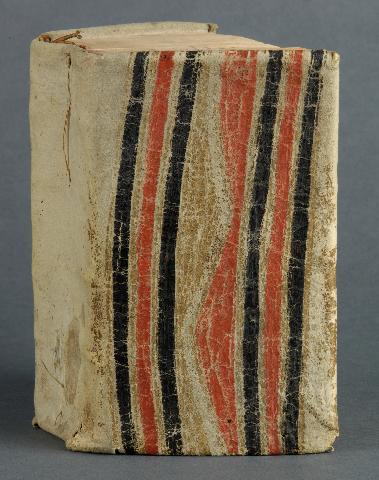You are here
Rare Books
Jonathan Edwards Library
Location designator: Ed
There are two main groups of Edwards materials in the Library. First, there is the Edwards Collection, about 60 volumes, which is separately arranged, classed and catalogued. It consists of books from the libraries of not only Jonathan Edwards but also many kin such as his father-in-law (James Pierpont, minister in New Haven, 1685-1714), his mother-in law (Mary Pierpont, herself a granddaughter of Thomas Hooker) and his son Jonathan Edwards, Jr., Class of 1765. All but a few of the Edwards Collection volumes came to Princeton in 1897 as the gift of John DeWitt, Class of 1861. The Rev. Dr DeWitt gathered them from many sources, including some formerly owned by the Rev. Dr. Tryon Edwards, great-grandson of Jonathan Edwards. Other books came from William H. Prestley (1895), Mrs William F-H. Dwight (1907), John H. Scheide, Class of 1896 (1941-2) and Mrs. Winthrop Dwight (1947). (At his death in 1758, Edwards left a library of about 300 volumes, valued at 77 pounds sterling, apart from a stock of his own published work.) The books in the Edwards Collection have to do exclusively with theology or religion: sermons (some by Edwards himself), Biblical commentaries, and published letters of famous religious figures. A listing of the material in the Edwards Collection (Ed) is on pp. 3407 to 3408 of Princeton University Library. Classed List. (Special Collections) vol. 6 (Princeton, 1920) [(ExB) 0639.7373.5]. [full text]. For a comparable listing of the Edwards books, see the entry for Jonathan Edwards in "Legacy Libraries: Libraries of Early America" section of LibraryThing.com, in particular the catalog of his library.
For commentary and description refer to: Howard C. Rice, "Jonathan Edwards at Princeton. With a Survey of Edwards Materials in the Princeton University Library" in thePrinceton University Library Chronicle XV, 2 (Winter, 1954) pp.69-89 [full text] . Fifteen of the inscribed volumes are described in detail in the above article. Other particulars about the collecting of Edward's literary remains are given in Franklin Bowditch Dexter, "The Manuscripts of Jonathan Edwards" in A Selection from the Miscellaneous Historical Papers of Fifty Years (New Haven, 1918).
Second, the Library has a gathering of editions of the writings of Jonathan Edwards. The following bibliography of Edwards writings has been checked against the Princeton holdings: Thomas H. Johnson. The Printed Writings of Jonathan Edwards. (Princeton: Princeton University Press, 1940). [(ExB) 6058.051].
Of the 346 items recorded in the bibliography, the Princeton University Library has about 160 (as of 1954). Also the Speer Library of the Princeton Theological Seminary has 100 of the items. Together they hold about 2/3 of the total number of entries in the Johnson bibliography.
 Johann Buxtorf Lexicon hebraicum et chaldaicum Basle, 1645 (Ex) 2291.231.11 |
Newspaper clipping laid in (ca 1844) "An Old and Curious Book. We have recently seen, in the library of the Rev. Tryon Edwards of this city, a copy of one of the early editions of Buxtorf's Hebrew Lexicon, printed at Basel in 1645, very nearly 200 years ago. It formerly belonged to David Brainerd, the well known missionary to the Indians ; and was bound by them for him with a piece of otter skin painted in their peculiar style, and from which they had cut the fur, evidently with knives of stone or shell. It was left by Brainerd at the time of his death, at the house of the elder President Edwards; and from him has come down, through two generations, to its present owner. It is indeed a rare and curious work." Almost fifty years later, a second report (1892) repeats much of the same information in connection with the book's display '[a]t the lecture on Brainerd, the missionary to the Indians, given in the Fort Street Church by Rev. Mr. Sexton. . . .' By this time the book was in the possession of Dr. Fitzhugh Edwards, 'of the eighth generation of the family in this country. Long ago as it was printed the typography is as clear and distinct as at the present day.' The book was presented to the Princeton University Library in 1907 by Mrs. William F. H. Edwards |

